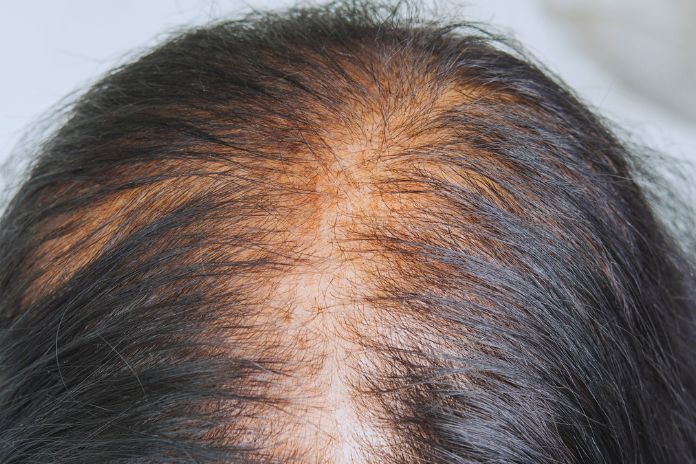Which remedies can be used to combat hair loss depends on the type of hair loss and its causes. We present the different types of hair loss and the respective naturopathic options.
Medicine Divides Hair Loss Into Three Groups
From a medical perspective, hair loss is divided into three categories:
- diffuse hair loss
- circular hair loss
- Balding
The diagnoses made are usually hormonal hair loss or hereditary hair loss. Appropriate medication—alcohol, hormones, and circular drugs—is prescribed, but those affected cannot be helped. The question arises as to whether the diagnoses made so far were complete and correct or whether the solution to the hair loss problem should not be sought in a completely different direction.
Hair Loss From A Naturopathic Perspective
From a naturopathic perspective, hair loss is a signal from the body that makes it clear that it has lost its balance. This imbalance can affect both physical and psychological levels. The more severe the hair loss, the more serious the health problem behind it. It is now essential to find out the cause of hair loss so that the problem can be solved permanently.
Hereditary Hair Loss
Hereditary hair loss is undoubtedly not hereditary in the sense that it is generally understood. Habits of parental behavior are more likely to be inherited than the predisposition to baldness!
Generally, it is assumed that “abilities” are “inherited” from the grandfather to the father and from the latter to the son. If the father, as the son’s role model, eats a lot of meat and sweets, drinks coffee in large quantities, smokes 20 cigarettes a day, is a stressed-out guy, and becomes bald over the years, no one will be surprised if the son adopting the same habits also loses his hair.
Hormonally-Caused Hair Loss
The therapy following the hormonal hair loss diagnosis only considers the current hormonal status. We immediately combat the symptoms with appropriate medications (pills, hormone injections, etc.) without looking at the entire person and questioning why the hormones are out of balance. If you consider that the hormonal balance always works in conjunction with the acid-base balance, you should also consider hyper acidification of the body as a cause of hair loss. In that case, drug treatment, including its side effects, would be unnecessary.
The Connection To Hyperacidity In The Body
In the physical area, hair loss is always caused by excessive acidity in the body—a so-called acidosis. Acidosis is a buildup of acids in the blood and tissues that causes the body’s acid-base balance to shift into negative pH values. The shift in the acid-base balance into the acidic range can, in addition to hair loss, result in accompanying health problems.
Where Do The Acids In The Body Come From?
Acid formation can have various causes:
- The consumption of food and beverages, especially animal proteins (meat, sausage, cheese, fish, eggs, dairy products, white flour products, confectionery, coffee, black tea, sweet drinks, mineral water, alcohol, and nicotine).
- Stress, anger, negative thoughts, lack of exercise, and dental and environmental toxins also produce harmful acids in the organism.
- Overeating with acid-producing foods and beverages also causes fermentation in the small intestine and putrefaction in the large intestine. The resulting flatulence develops ammonia gasses, which are toxic to the entire organism. In particular, the liver is put under massive strain.
Usually, all acids produced in the body (see above) are neutralized with minerals and eliminated via the kidneys. For this neutralization, the organism uses, among other things, the minerals stored in the hair base and stores metabolic toxins there in their place. Therefore, the beginning of hair loss is often the first sign of the massive breakdown of minerals within the hair base.
The Connection To The Intestines
Naturopathy says that each intestinal villi is energetically connected to a hair papilla. In other words, you can always draw conclusions about the intestines’ condition based on the scalp’s condition. The intestine, therefore, plays a vital role in hair loss and all scalp and hair problems.
Hair loss is often accompanied by symptoms such as bloating, constipation, or diarrhea, but not necessarily. For example, a nutrient utilization disorder can be present without the intestine reacting in the abovementioned form.
The food consumed cannot be adequately metabolized if the intestinal function is disturbed. As a result, deficiency symptoms occur in the body. Since the supply of nutrients to the hair base is not vital for the organism, it will first supply the organ system with the nutrients available. The hair base suffers from a nutrient deficiency, meaning the hair roots are undersupplied. As a result, hair loss develops. Regardless of whether a disruption in intestinal function is noticeable, the urgent recommendation is to include the intestines in the hair loss treatment as an intestinal cleanse.
The Connection To The Psyche And Fear
Hair reflects our strength and shine. Are we “in shape” and healthy? So is our hair. If scalp problems, such as hair loss, occur, it is a sign that the person has lost their balance. Hair conveys profound messages to us if we receive the signals openly and attentively. Since our hair symbolizes vitality and strength, loss of hair shows a loss of strength, power, influence, and face. Hair loss can be caused by fear of loss (fear of new or unknown things).
Hair loss fuels even more fear: losing what’s left and ultimately being left with nothing. Without hair, without vitality, without strength, The solution here would be to explore the fears, reduce them, and return to life. As fears subside, hair loss will also decrease. From a naturopathic perspective, looking at the person affected by hair loss is necessary. The balance in the physical and mental areas must be restored.

